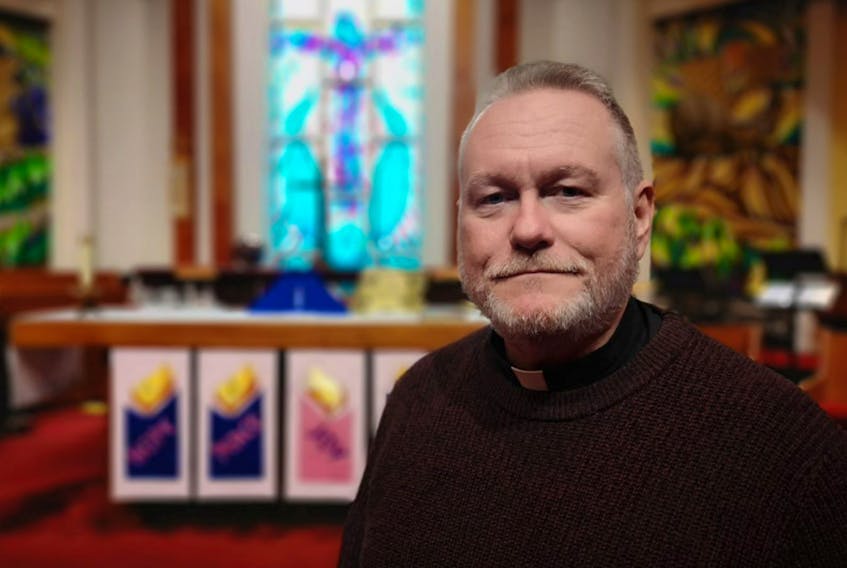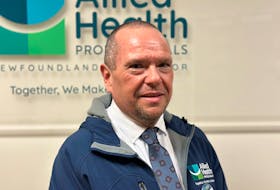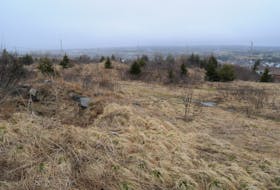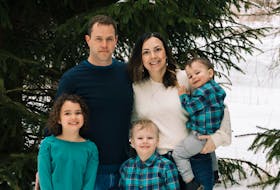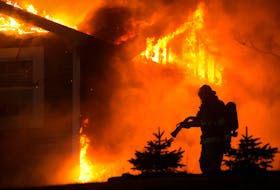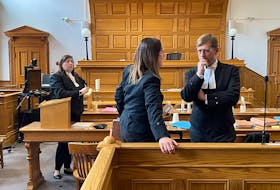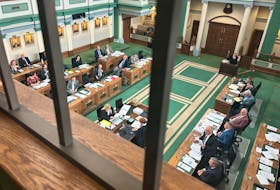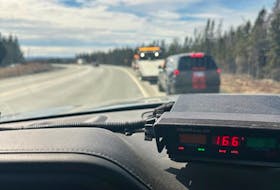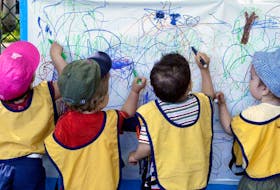ST. JOHN'S, N.L. — Stationed in West Germany with the Canadian Forces between 1988 and 1992, Mark Nichols remembers how it felt when the Berlin Wall fell.
“When I went there was West Germany and when I left there was just Germany,” said Nichols, the associate rector at St. Mark’s Anglican Church in east-end St. John’s.
“It was the end of the Cold War, which for the first 10 years of my career was what we trained for. It was why we were over there. We were the NATO force to stop a Soviet advance into Western Europe.”
Then, the existential threat to humanity was nuclear war, Nichols said.
“That was what really kept people awake at night,” he said. “Well, now it was suddenly over.”
For Nichols, it was surreal to watch as Russian forces, who for so long were considered the enemy, were suddenly landing their planes right next to where he worked.
But as the world turned away from the fear of one existential threat, Nichols says he watched another rise in front of him.
“Back then, we said that (human beings) were very likely behind (climate change),” he said. “Now we know we are behind it.”
Nichols left the military in 2001, after 20 years of service. He always had religious faith, but began taking the idea of becoming ordained seriously in his last three years in the military, which he spent in St. John’s.
“We belonged to a parish community. (We were) getting more involved in there, and then my priest asked me to consider it,” Nichols recalls.
After about a week of consideration and in discussing it with his wife, Darlene, she finally put things in perspective for him and he decided becoming an ordained minister was the right path.
“(She said) all of the experiences I had in my childhood — which was extremely poor, extremely nomadic — that all of that was, in her mind, leading up to this moment,” he said. “Because I had all those experiences, I could now use that from a healthy place, to serve other people.”
He says almost all his childhood was spent in poverty, with people looking down on him and not treating him with dignity. From kindergarten to Grade 12, he was in 16 different schools.
Nichols says constantly trying to fit in among new people and a constantly changing environment was difficult, but it led him to have compassion for outsiders and those in need.
Nichols is being interviewed just a few feet away from the Christmas hampers that he and others from his church have packed for people in need. He says it’s therapeutic to give food, because he knows how hard it can be to ask for help when you need it.
“If there’s one thing that really angers me, it’s social injustice,” Nichols said.
“I really see the environmental side of it, the creation-care side of it, as part of that. The people that bear the burden for (climate change) are the world’s poor, the elderly, people in developing nations and our children.”
Recently, Bishop Geoff Peddle of the Anglican Diocese of Eastern Newfoundland and Labrador announced Nichols would undertake a new part-time role with the diocese — a position they call creation-care animator.
“Christians are people who walk by faith in a God who created everything,” Nichols said. “With respect to this Earth, our sacred stories tell us that God entrusted this Earth into our care, our stewardship.”
In his new role, the goal is to animate or inspire people to take action on climate change.
Nichols, 56, has two daughters — Melissa Lindsay and Courtenay Guy — and four grandchildren, Aiden, Natalie, Rachael and Samantha.
His oldest daughter, Melissa Lindsay, says her father’s ability and desire to immerse himself and his family into what surrounds them means it’s no surprise he has become so inclined toward environmentalism.
She says her father doesn’t waste much.
“He’s got it down to a science,” she says.
She says that as the family recently got together to decorate for Christmas, she was still learning things from him.
“I didn’t know you could compost ice cream,” she said.
Nichols says the role of creation-care animator is perfectly aligned with the missions of the church and Christianity in general.
“If Jesus says, ‘Who is my neighbour?’ we often talk about the poor, the stranger and the immigrant,” Nichols said. “I’m in a place now where I say, ‘Who is my neighbour?’ (and) it’s also the other species I share this planet with … not just other human beings. It’s the trees and the wolves and the birds, the whales.”
He says that for too long humans have been anthropocentric, thinking of themselves as the most important thing on the planet.
“The church is being called to … look at a creation-centric way of being,” he says.
“I often say to people, we need the Earth, but the Earth really doesn’t need us. … We need to improve that relationship we have with the rest of creation.”
[email protected]
Twitter: @andrewLwaterman
Related

